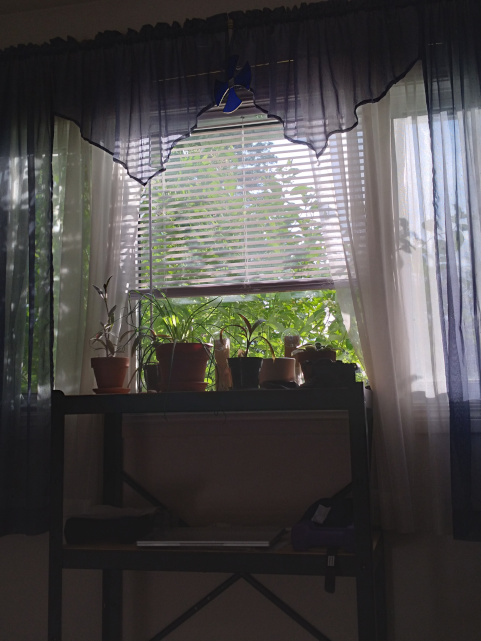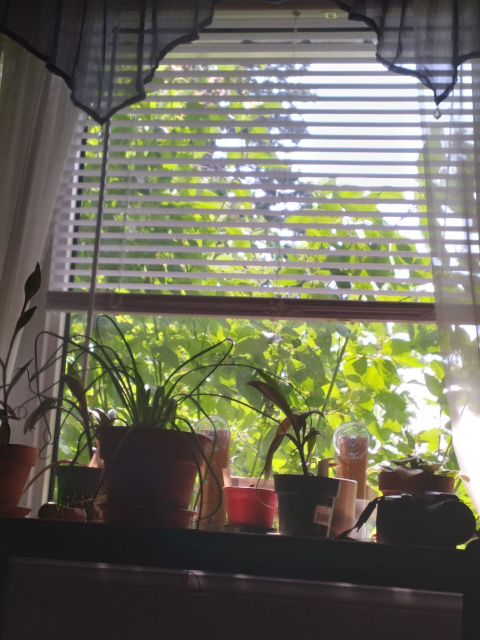
My opening photo was taken about a year ago during a visit with a friend in Victoria, BC. It soon became my phone’s background, and I have repeatedly contemplated the interplay of lines, the range of textures, and the subtle dance of muted colors. From the froth of the grass fronds to the mysterious black bulk of the forest and down to the dry grass, lit by the last bright rays of sunlight, the scene delights me. The V-ripples of the few ducks are an unexpected gift; I had focused on colors and clouds, not ducks.
A life-long prairie dweller, I was an awed visitor here, marvelling that late September could offer such a visual feast for the eyes. All that water, salt water at that. Would one ever tire of it?


Now in another summer, and still held captive by persistent pain (an angry sciatic nerve, if you must have specifics – see previous post), I see this photo every time I pick up my phone. It comforts me as I try to accept my current status as a broken person. Not fully functional.
In the last weeks, I have had more than enough time to think about that “not fully functional,” suboptimal condition. I have pondered the ways that humans enter that state:
- We are made sick through viruses, bacteria, or harmful substances. Fortunately, Western medicine has become quite adept at treating diseases, discovering causes, finding medicines, developing vaccines, improving hygiene, etc.
- We are injured through accident or others’ malevolent actions. Here, too, we have remedies; trained first responders, skilled surgeons and therapists, inventors of mechanical aids of all kinds, and rehab specialists. We can do something about injuries, at least the physical ones.
- We are broken—through age that wears out parts, through misuse that makes our organs miserable, through initial genetic misfirings, through . . . . ? We can detect brokenness, in most cases, but have trouble seeing causes, or can’t tell where physical breakage has led to emotional breakage, or the other way around. It’s taken us far too long to recognize consequences of trauma and/or abuse. We’re also not very good at distinguishing between brokenness and difference (should we be talking about a continuum?)
The unknown is frustrating in all three categories, never mind that the categories overlap and won’t stay sorted. Just find the problem and fix it, fast—that’s the mantra of our culture. It has not served me well this time around.


Then, in my quiet, sometimes lonely, pain-ridden hours came the gift of a book recommendation, serendipitously from the friend whom I’d been visiting when I took the photo that opens this posting. With the quirkiness of grace, the book’s title was The Giver.
Yet more—it wasn’t The Giver that I really needed to read (although I loved it), but the companion novel that Lois Lowry wrote: Gathering Blue. In that imaginary world, one small scamp of a lying, thieving boy who’s been cuffed and yelled at and beaten and starved, travels from his village—where survival is all that matters and everyone grabs what is available and fights for what is not, and anyone who is sick or injured is promptly dragged to the Field of Leavings to die—yes, this wild little boy named Matt goes off to the “far beyond” in search of a blue-dyeing plant for the only friend who’s ever shown him kindness, and finds a wholly different Village he calls “the place of Broken People.”
Upon his return with the desired plants and a strange, blind man (resident of the Village of Broken People), Matt is at a loss to describe this place where he was immediately welcomed and cared for after his arduous journey through the Forest. “Them be all broken, them people,” he said, “But there be plenty of food. And it’s quiet-like and nice.”
When his friend, Kira, a girl with a bad leg from birth (saved from immediate death only by a determined mother who refuses to let the village expose the infant as would be the usual practice), questions Matt further, he shrugs in bewilderment: “Like you. Some don’t walk good. Some be broken in other ways. Not all. But lots. Do you think it makes them quiet and nice, to be broken?” Kira does not know how to answer. Her mother had taught her, “pain makes you strong.” But this tale of people who rescued strangers like the blind man now before her and tended them until they healed baffled her. No one in her village would have ever done that, let alone even known how.
Lowry, however, does not offer the easy answer that Matt seems to grasp at, that being broken makes people nice. There are other characters in the novel who have let pain and loss turn them cruel and even more ruthless in their fight to survive and gain power.
In the end, Gathering Blue offers simply the metaphor of the rare blue dye made from woad, which can be found only in the “Village of Healing.” As the blind man explains, his pronouns crucially changing, “There is always someone to lean on . . . Or a pair of strong hands for those who have none. . . . They help each other . . . we help each other.” It is left to us readers to consider how, in our world, we might move from the awed “they help each other” to the voice of belonging: “we help each other. . . . we are like a family.” Both those who are broken and those who are not.
“The village of healing has existed a long time. . . . Wounded people still come. But now it is beginning to change, because children have been born there and are growing up. So we have strong healthy young people among us. And we have others who have found us and stayed because they wanted to share our way of life.”
Lois Lowry





